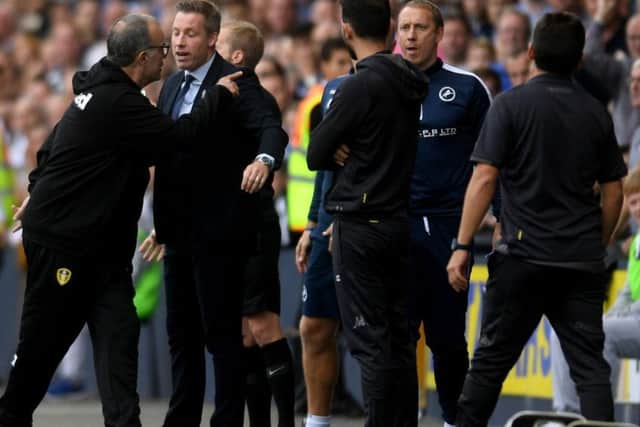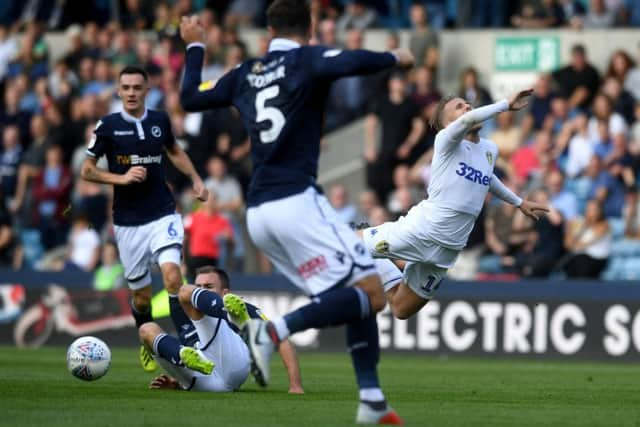Phil Hay: Chasing the moral high ground is not Millwall boss neil Harris' best option


Lost in translation, slightly, but still an affront to the east end of Edinburgh as he once knew it. His culture, his way of life and if you don’t like it, here’s a pool cue around the head.
When the occasion suits, British football likes to think of itself as principled too. Players and staff react to goals with decorum and coaches press the flesh at the death, however bad the blood between them. Nuno got it in the neck from Neil Warnock in April when, in the grip of the mayhem, he forgot to shake Warnock’s hand after Cardiff missed two injury-time penalties in a 1-0 defeat to Wolves. “He has to learn that in British football, you have manners after you’ve won a game,” Warnock said.
Advertisement
Hide AdAdvertisement
Hide AdBelieve it or not, they have manners abroad too. And they probably wince like the average Englishman when they watch a player like Joe Bennett raking his studs down the leg of another like Leroy Sane. Nuno got lost in the moment last season – not for the first time, it should be said – but he offered Warnock an apology, on the pitch and off it. “I don’t accept it all,” Warnock replied.
It must be hard being a heathen; to arrive from the wild west and find the game in this country operating at an elevated level of decency. When Neil Harris criticised Leeds United’s reaction to their equaliser at Millwall on Saturday – “a disgrace in English football,” to quote him precisely – it was almost as if Steve Morison had not been captured goading the South Stand after Millwall’s late winner at Elland Road in January (which, if we’re being non-partisan, is what happens when a crowd taunts a player all day).
It was almost as if the boundaries of disgraceful don’t climb much higher when Millwall play Leeds. Harris of all people should be aware by now that chasing the moral high ground in this particular fixture is never a good idea.
Whichever way his comment is cut, it represents an attack on the nationality – and by insinuation, the culture – of Marcelo Bielsa, his staff and his players. This is England and in England we don’t celebrate like Leeds celebrated. If you were English, you would know.
Advertisement
Hide AdAdvertisement
Hide AdBielsa has no domestic influence in a largely Latino backroom team – Argentinians, a Chilean and a Spaniard alongside his French fitness coach – and he is very much on foreign soil but he is not, as he said on Monday, a “guest in this country” or alien to it.


He has a work permit, a track record of coaching in elite European leagues and a reputation which sailed him through the Football Association’s visa hearing. He is in the Championship on the same terms as any other manager and the subject of total fascination. If Leeds wanted long throws from Ryan Leonard, they need only have taken the train to Bermondsey.
They wanted more than that so they sent their entire senior management team to Argentina and stumped up the largest salary the club have ever paid any manager in 100 years. Bielsa represents idealism, the concept of football as art and according to his charge sheet, he is more inclined to fight his own club over his own expectations than war with opposition coaches or referees.
A coach with his creed runs the risk of being cast as a myth if and when it all goes wrong but he has captured the attention of those who want to find out.
Advertisement
Hide AdAdvertisement
Hide AdLeeds’ reaction to Jack Harrison’s goal on Saturday was self-explanatory. The clock had reached 89 minutes at a ground where they usually cave in, a few minutes on from an argument which broke out between the two benches and found Bielsa at his most irate.


Millwall’s attempt to delay a throw-in led to that scuffle, though there is no point being precious about the oldest tactic in the book. As Harris said, everyone time-wastes when they’re minutes from a win. Everyone tries to run the seconds down. Why else would Dennis Wise have taken such objection to the multi-ball system when he was managing Leeds a decade ago?
As for Samuel Saiz, parity at Millwall was a release of multiple tensions. He’d run all afternoon without getting anywhere. True to form, he’d been in the vicinity of the touchline handbags. And prior to Harrison’s finish, he’d suffered the indignity of falling on his backside in front of a huge bank of Millwall supporters as he tried to retrieve possession for a throw.
Harrison’s shot flew in and for a moment it seemed that Saiz was sprinting 40 yards in the direction of Harris and a world of trouble. Instead, he embraced Bielsa’s staff. And with that, Leeds left London with a lecture from Millwall about sanitising the sport.
Advertisement
Hide AdAdvertisement
Hide AdWere Bielsa to closely analyse the archetypal English celebration, he would find that the game operates on a tit-for-tat basis. No club is clean.
Fulham’s bench provoked James Beattie by reacting as they did to Tom Cairney’s equaliser against Leeds in 2017 but his finish – placed brilliantly onto a postage stamp from 20 yards with six minutes of injury-time gone – was as crucial a goal as either club scored or conceded all season. It mattered and Fulham knew it mattered. So did Leeds. Accept the reality and let them have it.
The truth about England is that every club has standards until those standards lapse. Every club has class until their competitive edge lets it slip. When the game twists dramatically in their direction, almost every person involved slips into the mind and body of a teenager, if only for a few seconds.
It’s football here, it’s football there, in this country and abroad, and it’s the last thing anyone should care about.